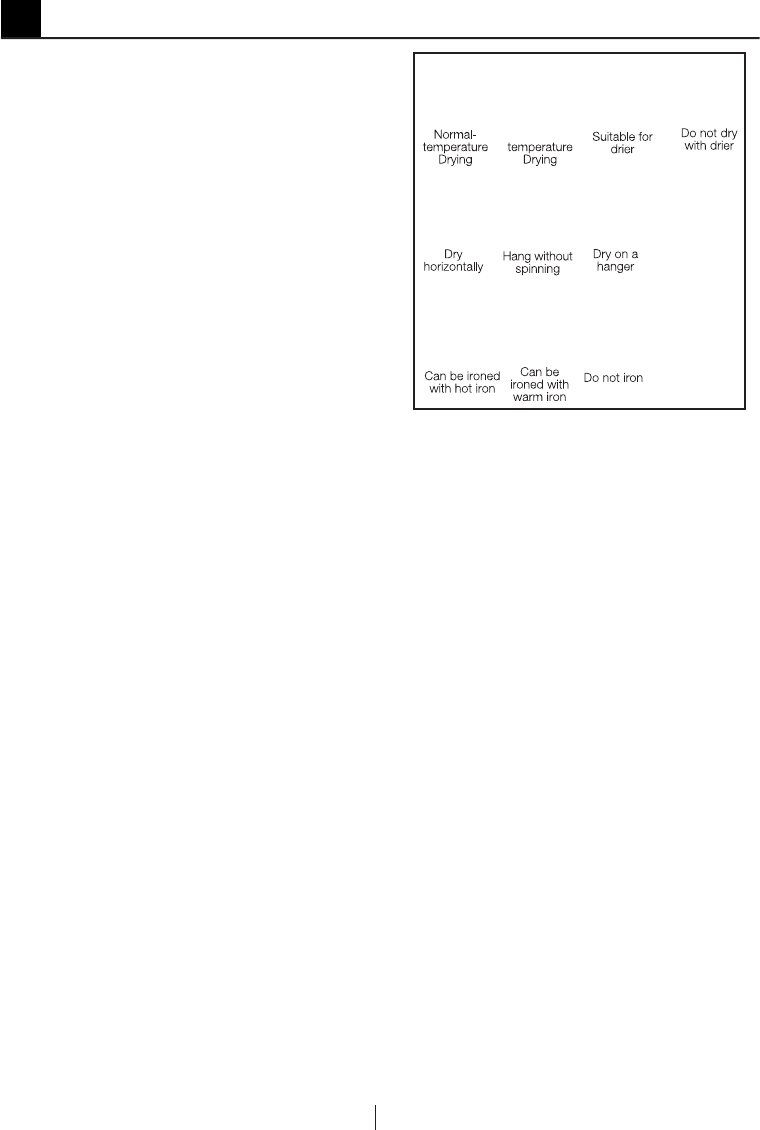
8
EN
Things to be done for energy saving:
• Make sure that you operate the product
at its full capacity but pay attention to not
exceeding it.
• Spin your laundry at the highest speed
possible when washing them. Thus,
the drying time is shortened and energy
consumption is decreased.
• Pay attention to dry same types of laundry
together.
• Follow the instructions in the user manual for
programme selection.
• Make sure that sufficient clearance is
provided at the front and rear side of the
dryer for air circulation. Do not block the grill
at the front side of the product.
• Do not open the door of the machine during
drying unless necessary. If you must certainly
open the door, pay attention not to keep it
open for a long time.
• Do not add new (wet) laundry during drying.
• Lint and fibres released from the laundry to
the air during the drying cycle are collected in
the “Lint Filter”. Make sure that you clean the
filters before or after each drying.
• In models with condenser, make sure that
you clean the condenser regularly at least
once every month or after every 30 drying
cycles.
• In vented models, follow the chimney
connection rules in the user manual and pay
attention to the chimney cleaning.
• Ventilate the room, where the dryer is located,
well during drying.
• For power saving in models with lamps, at
times when your dryer is not in use, keep the
door closed if the On/Off button is pressed (if
the dryer is energized).
Laundry suitable for drying in the
machine
C Always follow the suggestions on the laundry
labels. Dry only the laundry having a label
stating that they are suitable for drying in
a dryer and make sure that you select the
appropriate programme.
A B C
l mn
o p q
D
Low
Laundry unsuitable for drying in the
machine
• Laundry items with metal attachments such
as belt buckles and metal buttons can
damage your dryer.
• Do not dry items such as woollens, silk
garments and nylon stockings, delicate
embroidered fabrics, laundry with metal
accessories and items such as sleeping bags
in the dryer.
• Laundry made of delicate and valuable fabrics
as well as lace curtains can be creased. Do
not dry them in the dryer!
• Do not dry items made of hermetic fibres
such as pillows and quilts in the dryer.
• Laundry made of foam or rubber will be
deformed.
• Do not dry laundry containing rubber in the
dryer.
• Do not dry laundry exposed to petroleum, oil,
combustible or explosive agents in the dryer
even if they are washed beforehand.
• Overly wet laundry or laundry with dripping
water must not be put into the dryer.
• Items cleaned or washed with gasoil/fuel oil,
dry-laundry solvents and other combustible
or explosive materials as well as the items
that are contaminated or spotted with such
materials should not be dried in the product
since they emit flammable or explosive vapor.
• Do not dry items cleaned with industrial
chemicals in the dryer.
• Do not dry your unwashed laundry in the
dryer.
• Items soiled with cooking oils, acetone,
alcohol, fuel oil, kerosene, stain remover,
3 Initial preparations for drying


















